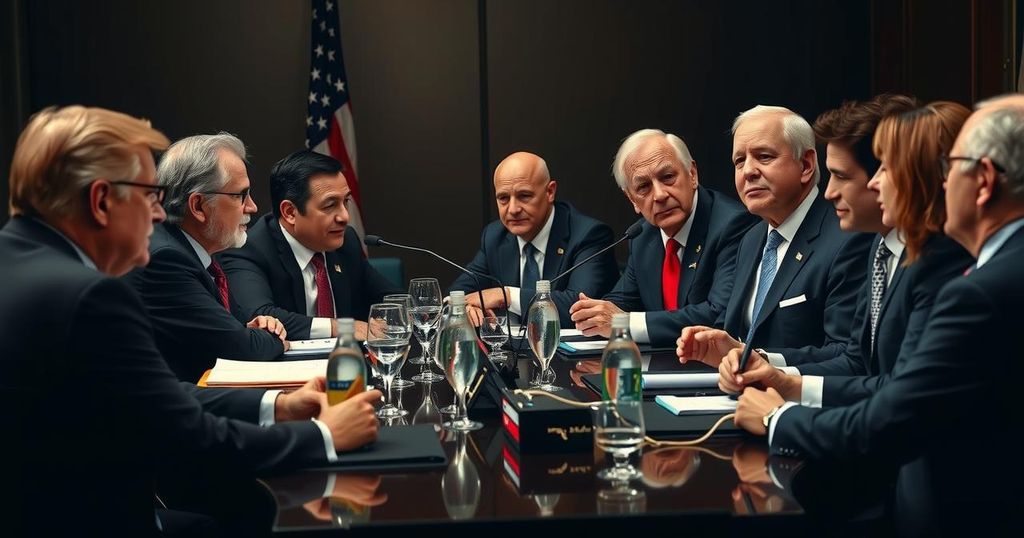Politics
2024 PRESIDENTIAL ELECTION, AL JAZEERA, ASH, ASIA, CHATHAM, DONALD TRUMP, ELECTION, EUROPE, EUROPEAN UNION, INDIA, LABOUR PARTY, MEDIA, MOD, NATO, NORTH AMERICA, STATES, TRUMP, U.S. ELECTIONS, UKRAINE, UNITED STATES, US PRESIDENTIAL ELECTION, US PRESIDENTIAL RACE, WHITE HOUSE
Jamal Walker
0 Comments
US Election: Global Leaders’ Preferences for President – Harris or Trump
As the U.S. presidential election nears, global leaders reveal varying preferences between Kamala Harris and Donald Trump. While Putin seems to favor Trump, many European leaders express support for Harris. Xi Jinping maintains neutrality, while Netanyahu leans towards Trump due to past ties. Modi is neutral, reflecting bipartisan agreements in U.S.-India relations. The election’s outcome will significantly influence international relations and global dynamics.
As the United States progresses towards its presidential election on November 5, world leaders’ preferences for candidates Kamala Harris and Donald Trump reveal geopolitical implications. Polls indicate a competitive race between Harris, the Democratic Vice President, and Trump, the former Republican President. Given the U.S.’s prominent global influence, international perspectives are crucial. Various global leaders exhibit preferences that reflect their national interests. Russian President Vladimir Putin appears to favor Trump, perceiving him as sympathetic to Russia, particularly regarding military support in Ukraine. Timothy Ash from Chatham House suggests, “Putin thinks Trump is soft on Russia and will roll over to give him a great deal on Ukraine.” Contrastingly, Xi Jinping of China has not declared a preference. Both candidates maintain a tough stance on China; however, behind the scenes, Chinese officials might lean toward Harris to ensure continuity in U.S.-China relations. Israeli Prime Minister Benjamin Netanyahu seems to prefer Trump due to their previous rapport, highlighting the personal relationships at play in international politics. In contrast, many European leaders express a preference for Harris, as her policies likely align more closely with their interests and values. Prime Minister Narendra Modi of India adopts a neutral stance, focusing on the continuity of U.S.-India relations irrespective of the election outcome. Leaders from South Korea and Japan weigh their interests in the Democratic and Republican platforms, with concerns about military commitments and trade policies influencing their positions. Australia also remains apprehensive about a Trump presidency, especially regarding environmental commitments and trade relationships with China. Thus, the preferences of global leaders for either candidate reflect the intricate interplay between national interests and international relations, underscoring the significance of the outcome of the U.S. election on the world stage.
The United States presidential election fundamentally shapes not only domestic policy but also international relations. With the upcoming election featuring incumbent Vice President Kamala Harris and former President Donald Trump, global leaders are closely observing the race. The outcomes are expected to affect a range of international issues, from military support to economic partnerships. The opinions of world leaders provide insights into how each candidate’s policies may resonate with foreign nations and impact global dynamics in the future.
In conclusion, the international preferences regarding the U.S. presidential candidates, Kamala Harris and Donald Trump, illustrate the complex relationship between U.S. policy and global diplomacy. While some leaders may openly express their preferences, others navigate their relationships based on perceived national interests and potential future policies. The election outcome on November 5 will have far-reaching consequences for the United States and its alliances worldwide, emphasizing the importance of understanding these perspectives in the context of global politics.
Original Source: www.aljazeera.com




Post Comment